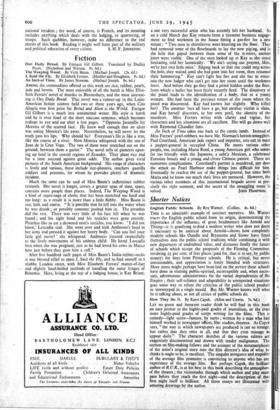Shorter Notices
English Public Schools. By Rex Warner. (Collins. 4s. 6d.)
THIS is an admirablt example of succinct narrative. Mr. Warner traces the English public school from its origin, demonstrating the importance of the influence of great headmasters like Arnold and Thring—it is gratifying to .find a modern writer who does not deem it necessary to be satirical about Arnold—shows how completely modern schools like Oundle and Bryanston and Stowe have fitted themselves into the public school tradition while combining it with new departures of undoubted value, and discusses finally the future of schools which accept the proposals of the Fleming Committee, involving 25 per cent. of free places (paid for, that is to say, by public money) for boys from Primary schools. He is critical, but never unreasonable, and appreciation is freely blended with strictures. More stress might perhaps have been laid on the service these schools have done in training public-spirited, incorruptible and, when neces- sary, adventurous administrators for the varied dependencies of the Empire ; their self-reliance and adaptability in unexpected situations goes some way to refute the criticism of the public school product as stereotyped in a single mould. But Mr. Warner knows well what he is talking about, as not all critics of public schools do.
How They Do It. By Karel Capek. (Allen and Unwin. 7s. 6d.) LET no green and innocent reader think he will find in this book an easy primer to the highly-paid grades of journalism or the even
more highly-paid grades of script writing for the films. This is comedy—light satire—fantasy, by turns ; written by a man who had himself worked in newspaper offices, film studios, theatres. As Capek says, "the way if1 which newspapers are produced is not so strange, but rather that they exist at all, and that they even manage If appear daily." The character sketches of the various editors are exquisitely discriminated and drawn with tender malignance. The section on film-making follows and the account of the metamorphosis - of the artist's original story into the film director's idea of what he thinks it ought to be, is excellent. The singular arrogance and stupidity of the average film promoter is convincing to anyone who has any experience of the average film. But perhaps Capek, the brilliant author of R.U.R., is at his best in this book describing the atmosphere of the theatre ; the vicissitudes through which author and play must pass before they reach the first night—and the description of that first night itself is brilliant. All three essays are illustrated with amusing drawings by the author.


























 Previous page
Previous page